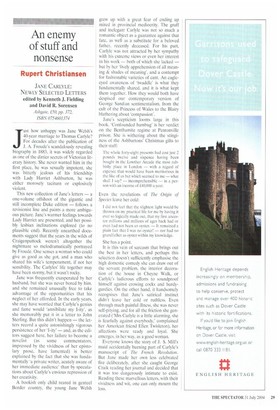An enemy of stuff and nonsense
Rupert Christiansen
JANE CARLYLE: NEWLY SELECTED LETTERS edited by Kenneth J. Fielding and David R. Sorensen Ashgate, £50, pp. 372, ISBN 0754601374 Just how unhappy was Jane Welsh's 40-year marriage to Thomas Carlyle? For decades after the publication of J. A. Froude's scandalously revealing biography in 1883, it was widely regarded as one of the dirtier secrets of Victorian literary history. She never wanted him in the first place, he was sexually impotent, she was bitterly jealous of his friendship with Lady Harriet Ashburton, he was either morosely taciturn or explosively violent.
This new collection of Jane's letters — a one-volume offshoot of the gigantic and still incomplete Duke edition — follows a revisionist line and paints a more ambiguous picture. Jane's warmer feelings towards Lady Harriet are presented, and her possibly lesbian inclinations explored (to no plausible end). Recently unearthed documents suggest that the years in the wilds of Craigenputtock weren't altogether the nightmare so melodramatically portrayed by Froude. One senses a woman who could give as good as she got, and a man who shared his wife's temperament, if not her sensibility. The Carlyles' life together may have been stormy, but it wasn't rocky.
Jane was frequently exasperated by her husband, but she was never bored by him. and she remained unusually free to take advantage of the opportunities that his neglect of her afforded. In the early years, she may have worried that Carlyle's genius and fame would 'annihilate my 1-ity', as she memorably put it in a letter to John Sterling. But this didn't happen — the letters record a quite astonishingly vigorous persistence of her 'I-ity' — and, as the editors suggest here, her failure to become a novelist (as some commentators. impressed by the vividness of her epistolary prose, have lamented) is better explained by the fact that she was fundamentally 'a private writer, acutely aware of her immediate audience' than by speculations about Carlyle's envious repression of her creativity.
A bookish only child reared in genteel Border country, the young Jane Welsh grew up with a great fear of ending up mired in provincial mediocrity. The gruff and inelegant Carlyle was not so much a romantic object as a guarantee against that fate, as well as a substitute for a beloved father, recently deceased. For his part, Carlyle was not attracted by her sympathy with his extreme views or even her interest in his work — both of which she lacked — but by her 'lively apprehension of all meaning & shades of meaning', and a contempt for fashionable varieties of cant. An eagleeyed awareness of `twaddle' is what they fundamentally shared, and it is what kept them together. How they would both have despised our contemporary version of George Sandian sentimentalism, from the cult of the Princess of Wales to the Blairy blathering about 'compassion'.
Jane's scepticism looms large in this book. 'Confounded humbug' is her verdict on the Benthamite regime at Pentonville prison. She is withering about the stinginess of the Ashburtons' Christmas gifts to their staff:
The whole forty-eight presents had cost just 2 pounds twelve and sixpence having been bought in the Lowther Arcade the most rubbishy place in London — with a regard of expence that would have been meritorious in the like of us hut which seemed to me — what shall I say? — incomprehensible — in a person with an income of 140,000 a year.
Even the revelations of The Origin of Species leave her cold: I did not feel that the slightest light would be thrown on my practical life for me by having it ever so logically made out, that my first ancestor millions and millions of ages hack had or even had not been an oyster. — It remained a plain fact that I was no oyster! — nor had no grandfather as oyster within my knowledge.
She has a point.
It is this vein of sarcasm that brings out the best in her letters, and perhaps this selection doesn't sufficiently emphasise the high domestic comedy she can draw out of the servant problem, the interior decoration of the house in Cheyne Walk, or Carlyle's ludicrous efforts to soundproof himself against crowing cocks and hurdygurdies. On the other hand, it handsomely recognises that Jane's satirical instinct didn't leave her cold or ruthless. Even through much painful illness, she was never self-pitying. and for all the friction she generated ('Mrs Carlyle is a little alarming, she is fearfully against everybody,' complained her American friend Ellen Twisleton), her affections were ready and loyal. She emerges, in her way, as a good woman.
Everyone knows the story of J. S. Mill's maid accidentally burning part of Carlyle's manuscript of The French Revolution. But Jane made her own less celebrated fire deliberately, after she caught George Craik reading her journal and decided that it was too dangerously intimate to exist. Reading these marvellous letters, with their vividness and wit, one can only mourn the loss.


























































 Previous page
Previous page